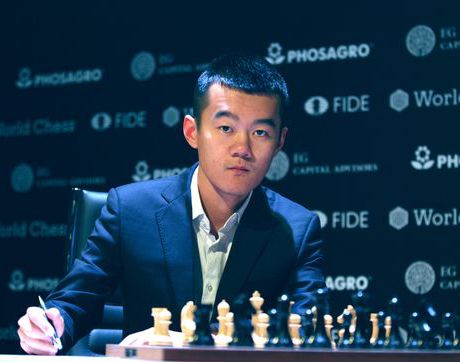
The "Big Dragon Project" and the birth of the "Chinese variation"
In 1966 the cultural revolution begun in China. It was a socio-political movement aiming primarily at purging China of all capitalist elements of society and promoting Maoism as the dominant ideology. Young people were actively encouraged to rebel against the system, their teachers, their parents and taught that "to rebel is justified." One of the casualties in this great purge was our royal game - Seen as a board-game played by the Bourgeoisie - definitely not Mao approved! For eight long years our beloved game was forbidden in China (bans were eventually lifted near the end of the cultural revolution in 1974-1976). It was truly a dark time for chess players in China and it seems hard to believe now, but a few years ago, chess in china was nowhere near from being the chess powerhouse it is today.

A propaganda poster for the cultural revolution. Everyone united with Mao Zedong
In the present day, the country now boasts a number of strong female chess players (including a number of women world champions) a strong male national team, whom have preformed well at Olympiads, and now a strong contender to the male world championship title with Ding Liren whom has qualified again for the candidates. Of the reported figure of 3 million players who play in China, it has produced 38 grand-masters and 21 woman grand-masters - An incredible feat in just 40 years.

Ding Liren's strong form puts him as one of the favourites for this year's candidates
 Hou Yifan - The highest rated female chess player in the world and at one time woman world champion
Hou Yifan - The highest rated female chess player in the world and at one time woman world champion
China's meteoric rise through the chess ranks, from exiled sport to world contender came about largely in the aftermath of the "cultural revolution." With China's vast population, the country was targeted as a potential fertile market to grow the sport in Asia. In Asia, chess had also traditionally been the second/third most popular strategy board-game: In china's case, it is the third most popular board game after xiangqi and go. With China's big population and a strong culture for strategic board-games, The "Big Dragon Project" was drawn up which aimed to push China to reach world-class status by the end of the century. Based on its successes, outlined in the last paragraph, a goal that has largely been fulfilled.

Dato Tan - A chess philanthropist, pictured in the middle, was one of the brains behind the "Big Dragon Project." He passed away in 2018 at the age of 92 - A decent innings if you ask me
In 1978, two years after this meeting, a great turning point occurred in Chinese chess that would change the way that China was seen by the chess world. At the Chess Olympiad of that year, the Chinese team stunned first round opponents Iceland by convincingly beating them 3-1. Top board for Iceland, Grandmaster Guomundur Sigurjonsson, would lose to then unknown Qi Jingxuan (annoyingly I can't find the pgn of this game. If anyone has this game please let me know). China would achieve a strong debut performance in their first Olympiad ending on a credible score of +6=3-5 and 20th place in the Buenos Aires tournament.
One particular game by China stood out however. According to Jonathan Speelman, in his greatest games book of 1970-80, outspoken Jan Hein Donner attempted to console the Icelandic grand-master, after their shock first round defeat, with an "unfortunate choice of words":
"Tell me, Grandmaster, how can a western European Grandmaster lose to a Chinaman" In round eight the Chinese played Holland. And the unlucky Donner got an answer to his question...
During the match it was said that many people gathered around Donner's board, including players from his own team, watching in awe as Donner lost to this unknown Chinese man. When Donner resigned, he got up and said to a reporter: "Now 800 million Chinese people will know my name." Indeed, this game would become immortalised as the Chinese Immortal!
A common misconception about this game is that this is the first time a Chinese player had beaten a grandmaster. In fact, Liu Wenzhe had also previously delivered a giant-killing by beating Nikolai Krogius in 1965, a year after Krogius had become a GM. I have provided the game without annotation as it is not the focus of this blog, but you will see how Krogius underestimated Wenzhe's strong tactical ability and gets himself into an early mess:
Liu Wenzhe would go on to have a very esteemed career in Chinese chess becoming an International master, the chief trainer of the Chinese Institute of chess and the head coach of the Chinese National Chess team.

Liu Wenzhe on the right pictured in 1978
The Chinese Variation
